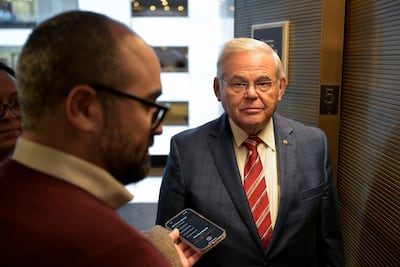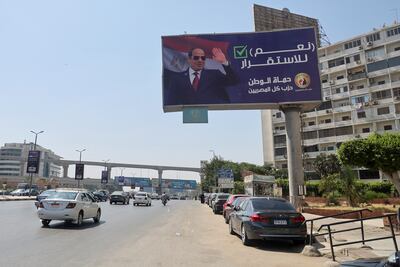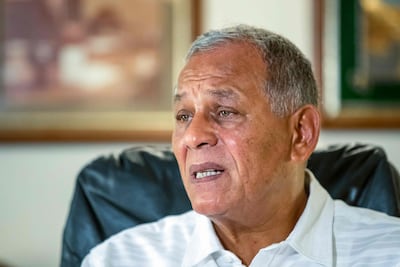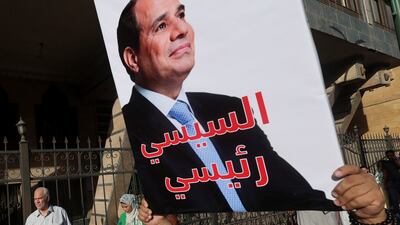The climate of relative freedom inspired by Egypt’s upcoming presidential election has emboldened many to deliver harsh judgments of President Abdel Fattah El Sisi’s nine years in office, mainly related to his handling of the economy and style of governance.
A former army general first elected to office in 2014, Mr El Sisi is yet to announce whether he will run for a third term, but it is almost certain that he will.
Barring unforeseen circumstances, a win is virtually certain for the 68-year-old leader. But the nation’s worst economic crisis in living memory, mounting criticism of his policies and a string of embarrassing revelations abroad are chipping away at the invincibility he once enjoyed.
Ramping up pressure on Mr El Sisi, the new chairman of the US Senate Foreign Relations Committee Ben Cardin threatened over the weekend to block military aid to Egypt – which runs at $1.3 billion annually – if it does not take concrete steps to improve human rights in the country.

The threat follows last month’s indictment of his predecessor, Democratic Senator Bob Menendez, over embarrassing allegations that he wielded his influence to aid Egypt’s government in exchange for bribes.
Mr El Sisi and his government have publicly remained silent on Mr Menendez's case, which has been unconvincingly dismissed by pro-government commentators as part of the rivalry between the Democrats and Republicans in the US.
Neither have they commented on the findings of North American researchers that authorities have spied on the phone of the most outspoken critic of Mr El Sisi, former MP Ahmed Tantawy, after he declared his intention to run against the president in the December election.
However, the Egyptian leader’s reaction to criticism of his policies at home has been described as dramatic.
“This is what we have done, but you have a chance to effect change in the next election. I am serious!” Mr El Sisi said on Saturday after his Prime Minister, Mostafa Madbouly, spoke at length of the government’s achievements in the nine years since the president took office.
Calling his detractors “liars, saboteurs and wicked”, the Egyptian leader sought to rebuff criticism of the multibillion-dollar infrastructure projects he has undertaken since taking office, which are described by critics as unnecessary, extravagant and major contributors to Egypt’s economic crisis.

“Don’t you Egyptians dare say you would rather eat than build and progress,” Mr El Sisi said. “If the price of the nation’s progress and prosperity is to go hungry and thirsty, then let us not eat or drink.
“Don’t undermine the cause of our nation and make us the world’s laughing stock. Stand fast and transform the cruel circumstances we are going through into a gift. The harder you stand fast, the sooner it (economic crisis) will pass,” he said on Saturday, the first day of a three-day forum during which, according to Mr El Sisi, the story of Egypt since 2011 will be told from the state’s perspective.
With most of Egypt’s 105 million people struggling to cope with soaring food prices – inflation was at nearly 40 per cent in August – Mr El Sisi’s message to Egyptians to make do with even less may be seen by some as unrealistic, or even odd.
However, it is somewhat predictable, given Mr El Sisi's persistent narrative that blames his country’s economic crisis entirely on the coronavirus pandemic and the Russia-Ukraine war.
Critics, however, contend that the president’s argument is designed to shift the blame away from his government’s overspending and excessive borrowing – foreign debt stands at a staggering $160 billion – to finance dozens of mega projects, including a new capital in the desert east of Cairo, a resort city on the Mediterranean and expensive and cutting-edge commuter trains and a monorail.
“What kind of country do you want to live in? Do you want to build Egypt and make it a nation of note, or not? Do you consider building an adventure? Do you consider reform an adventure?” Mr El Sisi said on Saturday.
The president's message that Egyptians should make do with less for the sake of the nation is being repeated, in different phrasing, by dozens of content creators across social media pages that have popped up in recent weeks to support Mr El Sisi in the December vote.

One of those pages – “Admirers of President Abdel Fattah El Sisi” – berated Egyptians who are complaining of how inflation eroded their purchasing power, even of basic food items.
“There are people who judge things in terms of cooking oil, sugar and yoghurt, but I see Egypt as a nation, a secure nation, a worthy entity, even if I go to bed hungry.”
Another similar page – “The Road to the New Republic” – also shared messages of support for the president.
“Why are you linking your love for Egypt to your standard of living? Will you hate your parents if they have a limited income?”

Others would try to strike fear in the heart of Egyptians, warning, as Mr El Sisi himself has done countless times, that political instability would plunge Egypt into a fate similar to that suffered by other countries in the region, like Syria, Iraq, Libya and Sudan.
“Eating a plain piece of bread while living in dignity in my own country is better than bread filled with everything that I eat while living at a refugee camp.”
Other pages simply label critics of Mr El Sisi as treasonous, supporters of the outlawed Muslim Brotherhood, or power-hungry.
These Facebook groups, as well as the narrative adopted by Mr El Sisi himself, pander to the aversion to change and fear of instability many Egyptians feel, particularly after the years of turmoil that followed the uprising that forced long-serving autocrat Hosni Mubarak to step down in 2011.
But opposition politicians who do not wish to see Mr El Sisi stay in office for another six years are insisting that it is change that Egypt needs the most now.
“Egypt cannot endure the continuation of the present policies and we don’t want to return to the days of chaos,” said Imad Gad, a spokesman for the opposition Liberal Trend, a coalition of opposition parties.
“Egypt needs a new president. El Sisi has done everything he can to protect Egypt and must be offered our thanks. Ten years are enough.”
Another senior politician, former MP Mohamed Anwar Al Sadat, warned that Egypt could be divided or even plunged into chaos because of the economic crisis and the lack of genuine democratic rule.
“We need free and fair elections that are not engineered in advance. A vote that guarantees a just political environment. An election with results that are not known in advance and which are held in a competitive framework,” Mr Al Sadat said.


